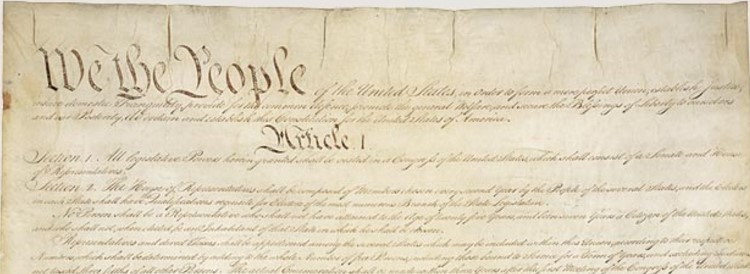The Senate of the United States shall be composed of two Senators from each State, chosen by the Legislature thereof, for six Years; and each Senator shall have one Vote.
We vote directly for Senators now (17th Amendment) but each state still gets two, and serves for six years.
Immediately after they shall be assembled in Consequence of the first Election, they shall be divided as equally as may be into three Classes. The Seats of the Senators of the first Class shall be vacated at the Expiration of the second Year, of the second Class at the Expiration of the fourth Year, and of the third Class at the Expiration of the sixth Year, so that one third may be chosen every second Year; and if Vacancies happen by Resignation, or otherwise, during the Recess of the Legislature of any State, the Executive thereof may make temporary Appointments until the next Meeting of the Legislature, which shall then fill such Vacancies.
After the Senate was set up, they arranged it so that we would not change the entire Senate at one time, but only 1/3 of them would be up for election at any one time.
No Person shall be a Senator who shall not have attained to the Age of thirty Years, and been nine Years a Citizen of the United States, and who shall not, when elected, be an Inhabitant of that State for which he shall be chosen.
You have to be thirty years old, have been a citizen of the US for nine years, and be a resident of the state from which you are elected.
The Vice President of the United States shall be President of the Senate, but shall have no Vote, unless they be equally divided.
The Vice President presides over the Senate (y’all do know that’s the meaning of “president,” right? One who presides? Pay attention to that. It’s gonna become important when we get to Article 2 and start talking about Executive powers). The Vice President doesn’t get a vote unless the vote is tied in the Senate. That’s not too common.
The Senate shall chuse their other Officers, and also a President pro tempore, in the Absence of the Vice President, or when he shall exercise the Office of President of the United States.
Other than the VP, the Senate can choose its own officers. There must be a President Pro-tem who becomes the President of the Senate if the VP becomes President of the United States. We don’t really want the President of the United State to be the President of the Senate. Talk about screwing up a balance of powers!
The Senate shall have the sole Power to try all Impeachments. When sitting for that Purpose, they shall be on Oath or Affirmation. When the President of the United States is tried, the Chief Justice shall preside: And no Person shall be convicted without the Concurrence of two thirds of the Members present.
If the House votes to impeach the President, the Chief Justice presides over the trial, which is held by the Senate. A 2/3 majority is required to convict.
Judgment in Cases of impeachment shall not extend further than to removal from Office, and disqualification to hold and enjoy any Office of honor, Trust or Profit under the United States: but the Party convicted shall nevertheless be liable and subject to Indictment, Trial, Judgment and Punishment, according to Law.
Impeachment merely means removal from office and being subject to being barred from holding further office in the US. It is not actually a criminal trial. But if you are impeached, you may be subject to a criminal trial and punishment as well.

